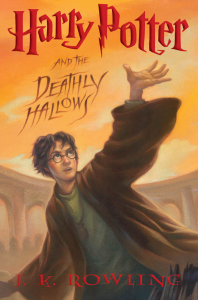Harry Potter and The First Chapter Edits
 I set out to edit the first chapter of Harry Potter and the Deathly Hallows because I remember reading it the summer before my senior year in college and thinking how I’d been taught to not write like that. Embedded in the bad writing is a story that speaks to millions. A story that according to the New York Times’ may change the world and has shaped my generation. A story this important deserves a good ending (not a happy ending, but a satisfying one) and as such it needs an editor to go through it and tighten the storytelling.
I set out to edit the first chapter of Harry Potter and the Deathly Hallows because I remember reading it the summer before my senior year in college and thinking how I’d been taught to not write like that. Embedded in the bad writing is a story that speaks to millions. A story that according to the New York Times’ may change the world and has shaped my generation. A story this important deserves a good ending (not a happy ending, but a satisfying one) and as such it needs an editor to go through it and tighten the storytelling.
Two things I need to state: Managing Editor Karyn Browne or Continuity Editor Cheryl Klein didn’t do a bad job because it wasn’t their job and J.K. Rowling isn’t a bad writer. All writers need an editor to critique their work and provide feedback about all the elements of the story (like the structure, plot, characters, and dialogue). You can see the bits of editing I’ve done but if I edited this book prior to publication I’d have recommended a confidence boost for the narrator and cutting the first chapter because it doesn’t make sense to start as a fly on the wall in Voldemort’s lair when the book isn’t about how Voldemort will take over the world but how Harry Potter is trying to stop him.
Brief recap of what arises in Chapter 1: Snape tells Voldemort the date the Order plans to evacuate Potter to safety. Yaxley tells Voldemort that he has successfully placed an Imperious Curse on Pius Thicknesse, a Head of the Magical Law Enforcement department in the Ministry of Magic, meaning Thicknesse is now their puppet. Voldemort reveals that the Death Eaters are going after the Ministry of Magic (although whether it is to kill Minister of Magic Scrimgeour or incapacitate him in some way isn’t mentioned). Voldemort takes Lucius Malfoy’s wand and insults the Malfoys and Bellatrix Lestrange over the recent wedding of Tonks, Narcissa Malfoy & Bellatrix’s niece, to Lupin, a werewolf. Draco Malfoy is miserable. With his new wand Voldemort kills Muggles Studies professor Charity Burbage and feeds her to Nagini.
Here’s my reasoning:
- Snape knows when the Order plans to move Harry but since we don’t know his source, knowing Snape has access to the Order’s information is pointless.
We’ll know the Order has been betrayed once the Death Eaters rain all over the escape plan. Also prior to the events at the end of Book 6 Snape is a member in good standing of the Order of the Phoenix and the Order continues to suspect that Snape knows their plans.
- The Imperious Curse on Pius Thickness and their plan to take out Scrimgeour.
We already know the Death Eaters curse people like Pius Thickness to get their way. Furthermore without being told specifics, we’d assume Voldemort and his crew will take a run at the Ministry of Magic because it is the governing body of England’s magical community and in order to control the people they’ll need to control it–and they’ll do it by either cursing Scrimgeour, the Minister of Magic or killing and replacing him with their own puppet. There is no reason for us to know the specifics when Potter/the Order doesn’t.
- Voldemort takes Lucius Malfoy’s wand and the Malfoys have become scapegoats in their own home.
The first half of this sentence is addressed in Chapter 5 with a vision. The second half is partially addressed in a different vision in Chapter 9. It could be fully addressed with another sentence during that vision or in Harry’s reaction to that vision.
- Voldemort knows Tonks and Lupin wed.
Death Eaters are closely watching members of the Order and know what is going on with its members more than Harry Potter does. As enemy combatants I’d expect them to be keeping tabs on each other as best they can, and the Death Eaters have always been well informed. Plus the Order didn’t contact Potter while he was in his childhood home.
- Voldemort kills Professor Burbage and feeds her to Nagini.
This death serves to later confirm the “nasty rumors going around” when Arthur Weasley tells Potter and company about how “[he doesn’t] believe the Muggle Studies professor at Hogwarts resigned.” Without seeing the death happen, most readers would still believe what Arthur Weasley says because he is a trusted source. Plus Arthur Weasley mentions people are “terrified that they will be the next ones to disappear, their children the next to be attacked” which is why it’s better for Arthur to tell us then for us to see it firsthand because without Arthur’s input, the death happens in a vacuum.
The audience doesn’t need to know any of these things before Potter does. Looking at the world from a different perspective is great if it leads to different understanding of the world that we can’t get from following Potter. If this chapter followed Draco Malfoy, Snape, or Voldemort closer there is potential for it to be at least worthwhile insight into the mind of one of Potter’s enemies (or supposed enemies) if still unnecessary. My writer senses say Rowling was a little bored, and started off with the Death Eaters instead of Harry Potter after six books because she could. However the book is called Harry Potter and the Deathly Hallows not Lord Voldemort and The Plot To Take Over The World.
Lastly I’d like to address my hubristic statement about the narrator needing more confidence.
The narrator is our guide in the story and this narrator goes back and forth about whether she can read someone’s internal emotions and motivations or not. Sometimes people are “terrified to make eye contact” or “longing for closeness” while other times characters are “evidently confused” and “apparently fearful.”
There are fifteen instances of the word seem, which is a lot of pointing out how things appear on the surface for twelve pages. There are also several more instances where things are evident and apparent. If you’re describing a scene, you don’t need to remind us that you are describing a scene. It’s like in essays for English class you’re not allowed to mention yourself– you don’t need to say, “I think Voldemort is a villain,” because we know that’s what you think, you’re the one saying it. Likewise with describing apparent seeming evidence, it’s happening the way you’re describing it because you’re the one telling the story and thus far we’ve found the narrator to be a trustworthy one.
The narrator also uses passive voice, according to Hemingway, 30 times. Unless the goal is to create distance between the reader and the action that needs to change. Some of the instances are in dialogue, which I left alone because people speak all sorts of ways– even with lots of adverbs and using passive voice.
There’s an interesting parallel between the narrator and Yaxley, one of Voldemort’s men in the Ministry of Magic. When Snape says when Potter will be moved, Yaxley disagrees and says “Dawlish, the Auror, let it slip that Potter will be moved” at a different time. When Snape gives better evidence that Yaxley’s wrong, Yaxley starts to defend his statements, saying, “Dawlish seemed quite certain.” This is similar to our narrator, who makes a statement then backs it up by telling us how something seems instead of how something is. As narrator she has the power to tell it like it is, not how it seems. Later when Voldemort invites Yaxley to speak, Yaxley becomes “determined to received some portion of approval” mentioning that he accomplished his task “with difficulty, and after great effort” and telling Voldemort things he already knows (like the Head of Magical Law Enforcement has regular contact “with the Heads of all the other Ministry departments.” In contrast Snape doesn’t talk much, his actions speak for themselves. The narrator repeats herself and talks more to make up for a lack of confidence. In small ways with the adverbs and larger ways with superfluous phrases. (E.g. “Snape nodded, but did not elaborate.” We can see Snape not elaborating by putting a period after nodded.)
The story is great, it’s why I devoured all seven books. The writing isn’t on the same level as story, which is sad since this is a book, but it’s also not the writer’s fault. Editing is one more process before getting your story out to the public, so I don’t blame anyone for not doing it. Especially if you’ve already presold over a million books before its publication date and you’re the first author to become a billionaire (in USD).
